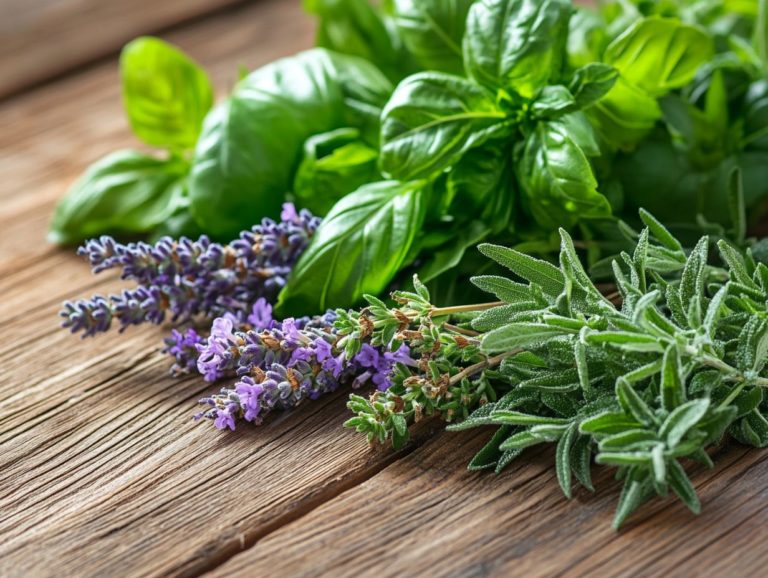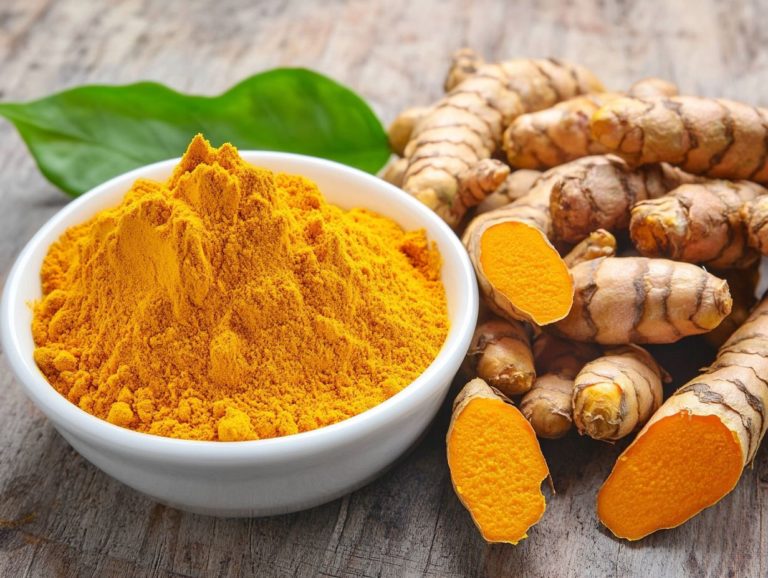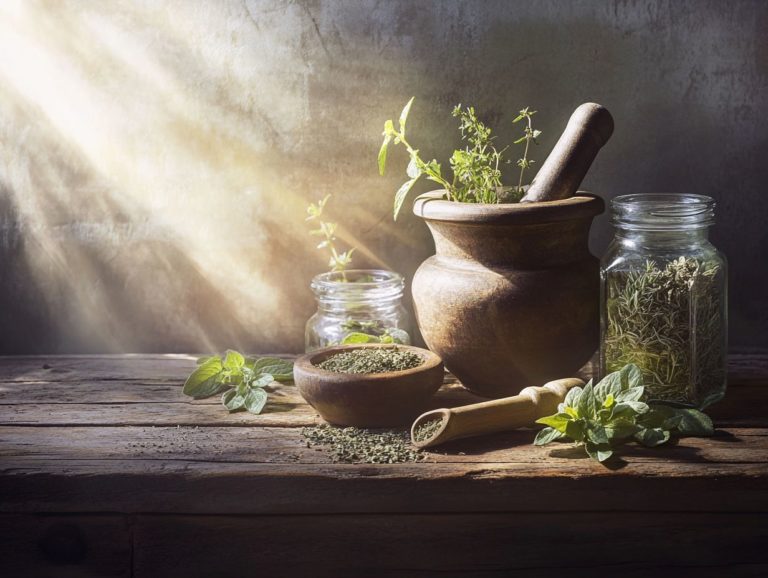The Science Behind Herbal Healing
Herbal healing has experienced a renaissance lately, as individuals increasingly pursue natural alternatives to conventional medicine.
This article delves into the essence of herbal healing, tracing its rich history and highlighting the vital role that plants play in fostering wellness.
You ll discover common herbs and their distinctive healing properties, along with insights into the safety and effectiveness of these remedies.
You will also find practical tips for seamlessly integrating herbal healing into your daily health routine. Discover how nature can supercharge your health journey!
Contents
- Key Takeaways:
- Understanding Herbal Healing
- The History of Herbal Medicine
- The Role of Plants in Herbal Healing
- Common Herbs and Their Healing Properties
- Safety and Effectiveness of Herbal Healing
- Incorporating Herbal Healing into Your Health Routine
- Frequently Asked Questions
- What is the science behind herbal healing?
- How do herbs work in healing the body?
- Is there scientific evidence to support the use of herbs for healing?
- Are there any potential risks or side effects associated with herbal healing?
- How is the science behind herbal healing different from traditional medicine?
- Can anyone use herbal remedies for healing?
Key Takeaways:
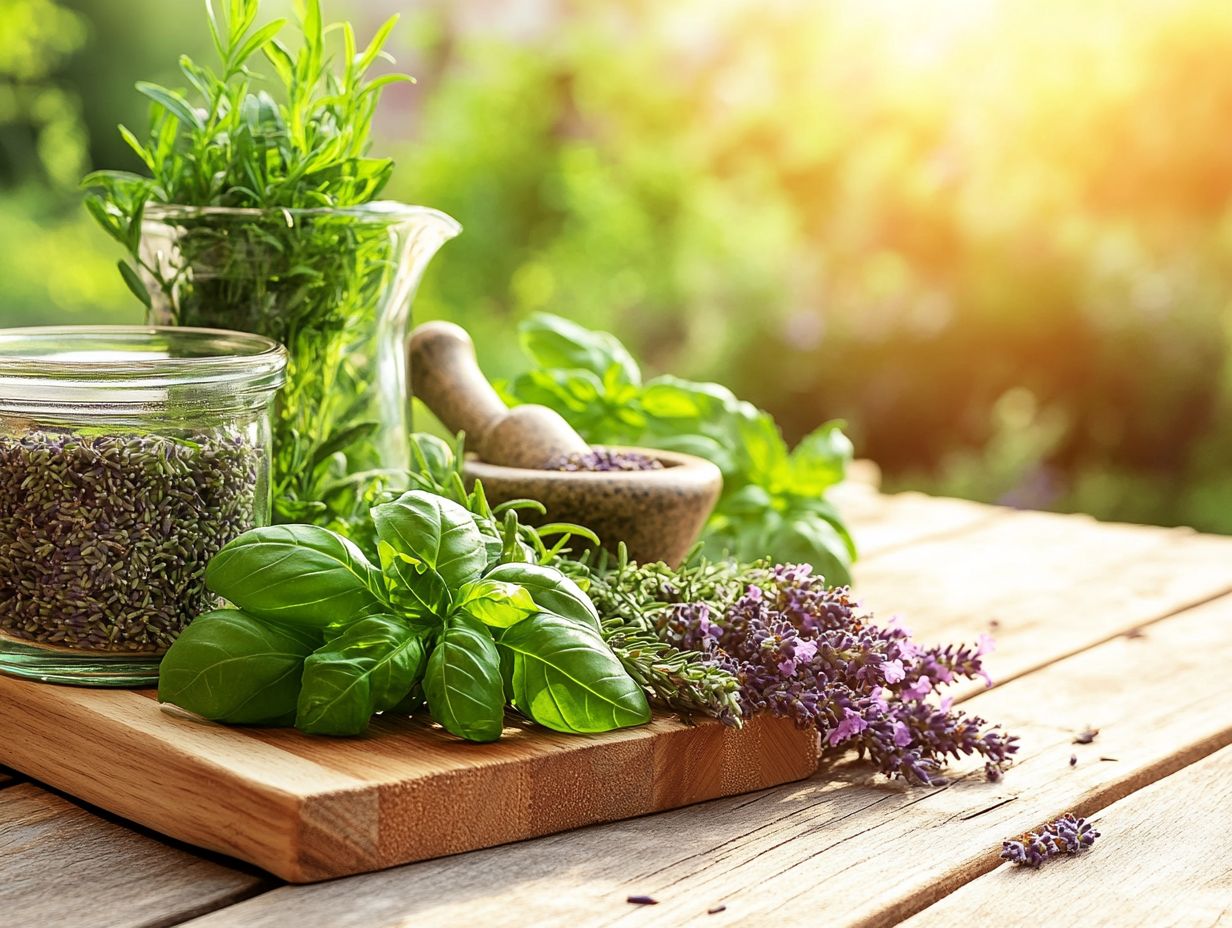
- Herbal healing is the use of plants for medicinal purposes and has been practiced for centuries.
- Plants have unique properties that help with various health concerns, making herbal healing a natural and effective option.
- When using herbal remedies, it is important to do proper research and consult with a healthcare professional for safe and effective integration into a health routine.
Understanding Herbal Healing
Understanding herbal healing invites you into the rich world of herbal medicine and plant-based healing. This realm emphasizes the power of plant-based remedies, utilizing various herbs such as St. John’s Wort and ginkgo biloba to enhance overall well-being and tackle specific health challenges.
This holistic approach underscores the importance of active compounds found in these herbs. It also necessitates a solid foundation in clinical experience and detailed patient case notes to guarantee both safety and effectiveness in treatment.
What is Herbal Healing?
Herbal healing involves using herbal medicine and supplements as a holistic approach to enhance wellness and address various health conditions.
This method weaves together a rich tapestry of practices, drawing on the wisdom of ancient traditions where specific herbs are honored for their therapeutic properties. Unlike conventional medicine, which often leans on pharmaceuticals that target symptoms rather than root causes, herbal healing champions a more integrative strategy.
It invites you to reconnect with nature and tap into your body s inherent ability to heal itself. Certain herbs, such as echinacea and chamomile, have been cherished across cultures for centuries.
Their versatility highlights their potential to address a broad spectrum of ailments, from digestive disorders to anxiety, making them invaluable allies in your wellness journey.
The History of Herbal Medicine
The history of herbal medicine stretches back thousands of years, reflecting humanity’s enduring reliance on plants to address health conditions. You ll find early documentation in ancient texts, but the story doesn t end there.
Recent clinical trials have emerged, validating the effectiveness of these remedies and offering a robust evidence base for various herbal treatments. This rich tapestry of knowledge highlights the timeless connection between nature and wellness.
Origins and Evolution of Herbal Healing
The origins of herbal healing can be traced back to ancient civilizations that harnessed the therapeutic benefits of plants, evolving into the esteemed field of plant-based healing, which emphasizes the use of herbs to address a variety of health conditions.
In traditions like Traditional Chinese Medicine, herbs such as ginseng and ginger have been utilized for centuries to boost vitality and improve digestion. Meanwhile, the ancient Greeks recognized the soothing properties of plants like chamomile and peppermint, employing them not just for flavor but for their calming effects as well.
Similarly, Ayurvedic practices from India have long celebrated turmeric and ashwagandha for their remarkable anti-inflammatory and stress-relieving benefits.
Today, you may find yourself rediscovering these ancient wisdoms and seamlessly integrating them into your modern wellness routine. This resurgence underscores the enduring significance of these time-honored plants in fostering health and balance in your everyday life.
The Role of Plants in Herbal Healing

Plants are essential in herbal healing, forming the foundation of herbal products and plant-based medicines. These plants are full of helpful compounds that can support your immune system and enhance your overall health.
How Plants are Used for Healing
Plants present themselves in various forms, including herbal products, teas, liquid extracts made from herbs (tinctures), and extracts within plant therapy. By harnessing the medicinal properties of herbs, you can effectively enhance your health and wellbeing.
The preparations you encounter may vary significantly in concentration and application. For example:
- Herbal tea made from peppermint leaves can support digestion.
- Tinctures, created by steeping herbs like echinacea in alcohol, serve to bolster your immune system.
- Dried herbs in capsules offer a convenient dosage for regular use.
- Essential oils, such as those from lavender, provide calming effects for stress relief.
By exploring these techniques, you can find tailored solutions to address various health concerns, from respiratory issues to anxiety.
Common Herbs and Their Healing Properties
Common herbs like St. John’s Wort, ginkgo biloba, garlic, and ginger are renowned for their healing properties. Each of these herbs has unique advantages for a variety of health conditions, such as uplifting your mood or supporting cardiovascular health.
Embracing these natural remedies can be a powerful addition to your wellness journey.
Examples of Medicinal Herbs and Their Benefits
Consider the wide array of medicinal herbs available:
- St. John’s Wort: Enhances mood.
- Ginkgo biloba: Supports cognitive function.
- Ginger: Aids digestive health.
- Garlic: Promotes cardiovascular well-being.
Discover the amazing benefits of herbal medicine with these powerful examples!
In holistic health, these plants provide more than just anecdotal support. A wealth of studies underscores their efficacy and safety. For instance:
- St. John’s Wort: Its active component, hypericin, can alleviate mild to moderate depression. However, it may interact with medications like antidepressants and birth control pills.
- Ginkgo biloba: Known for memory improvement and circulation enhancement, it contains flavonoids that promote brain health. Some individuals may experience headaches or gastrointestinal discomfort.
- Ginger: Renowned for its anti-nausea qualities, but excessive amounts could lead to heartburn.
- Garlic: Well-documented for lowering cholesterol and blood pressure, yet it has blood-thinning properties that require caution for those on anticoagulant medications.
Understanding each herb’s unique profile is crucial for ensuring safe and effective use.
Safety and Effectiveness of Herbal Healing
The safety and efficacy of herbal healing are increasingly supported by clinical trials and growing evidence. This assures you that using herbal medicine is not just beneficial but also safe for those exploring alternative therapies.
Research and Evidence for Herbal Healing

Research and evidence for herbal healing have seen remarkable growth. Numerous clinical trials validate the effectiveness of various herbal medicines, contributing to a strong evidence base that supports their integration into contemporary health practices.
Understanding this evolution is essential, especially as you seek natural alternatives to conventional pharmaceuticals. For example, studies have revealed that turmeric, the active ingredient in turmeric, can significantly reduce inflammation in conditions like arthritis. Similarly, clinical trials on echinacea have demonstrated its effectiveness in shortening the duration and severity of colds.
These findings highlight the importance of ongoing research. This work not only bolsters the credibility of herbal remedies but also gives you the power, whether as a practitioner or a patient, to make informed decisions about health. As scientific inquiry progresses, it becomes increasingly evident that herbal solutions can effectively complement modern medicine.
Incorporating Herbal Healing into Your Health Routine
Incorporating herbal healing into your health routine requires careful consideration and expert guidance from a qualified health practitioner. This approach ensures that the herbal supplements you choose are tailored to your specific health conditions and deemed safe according to your individual case notes.
Tips and Guidelines for Using Herbal Remedies
When exploring herbal remedies, consult a health expert! Understanding dosage recommendations and potential interactions with any pharmaceutical medications you may be taking is vital.
Sourcing quality products from reputable suppliers significantly influences effectiveness and safety. Take the time to read labels thoroughly and opt for brands that offer transparent sourcing information and third-party testing results.
Watch for side effects carefully, as individual responses to herbal supplements can vary widely. Keeping a detailed log of your experiences can help you pinpoint any adverse reactions.
Most importantly, maintain an open line of communication with your healthcare providers. This ensures that your use of these remedies aligns with your health goals. This informed approach prioritizes your well-being, allowing you to navigate your health journey with confidence.
Frequently Asked Questions
What is the science behind herbal healing?
The science behind herbal healing is a branch of medical science that studies the effects of natural plant-based remedies on the human body. This includes understanding the chemical compounds and mechanisms of action of various herbs and how they can be used to promote healing and wellness.
How do herbs work in healing the body?
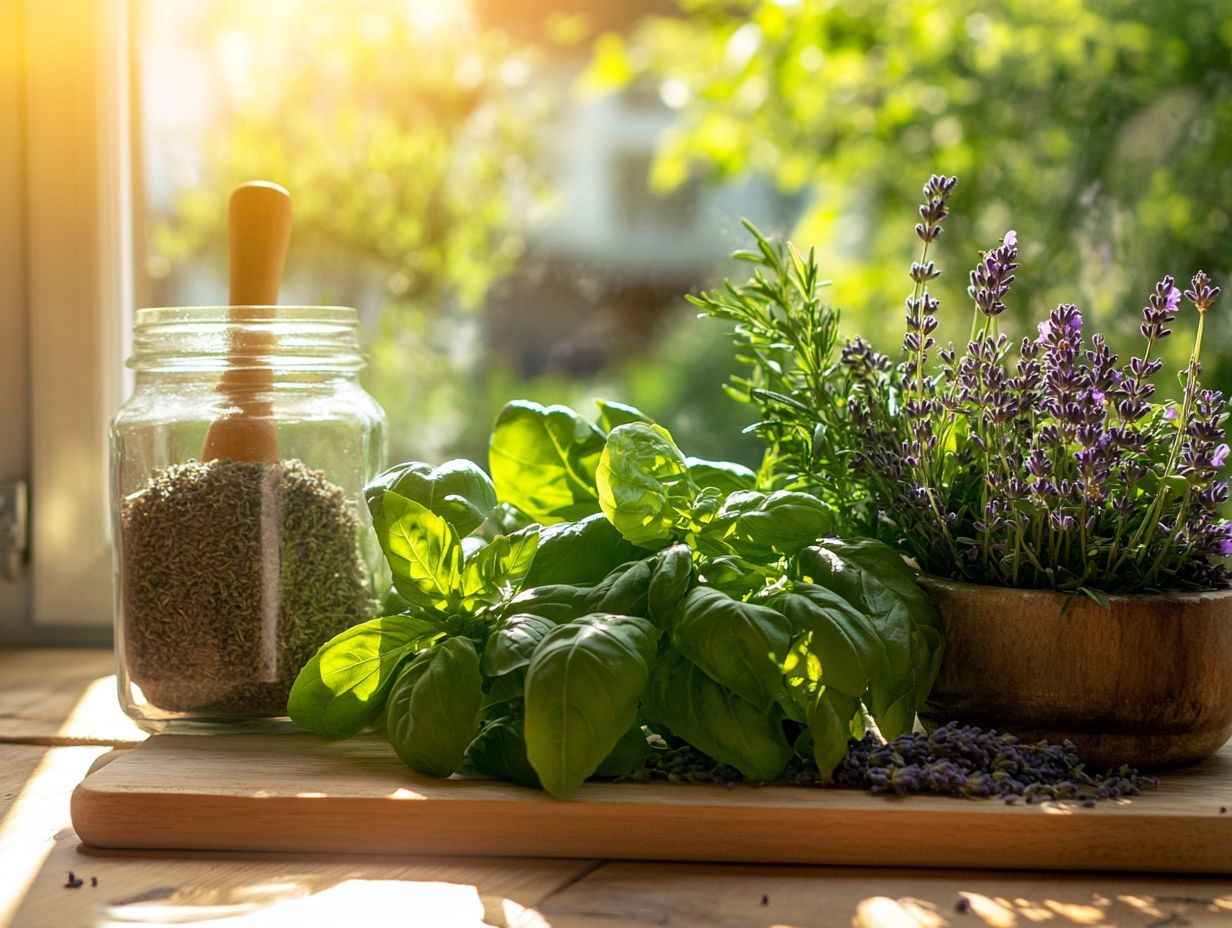
Herbs contain active ingredients that interact with the body’s cells and systems to produce therapeutic effects. These compounds can stimulate or support the body’s natural healing processes, such as reducing inflammation, boosting the immune system, or balancing hormones.
Is there scientific evidence to support the use of herbs for healing?
Yes, there is a growing body of scientific research on the effectiveness of herbal remedies. Many studies show that certain herbs can effectively treat specific health conditions, and more research is being conducted to better understand how they work and how they can be used in modern medicine.
Are there any potential risks or side effects associated with herbal healing?
Just like any medicine or supplement, herbs can have potential risks and side effects. It is essential to consult with a trained herbalist or healthcare professional before using herbs, especially if you have any underlying health conditions or are taking medications.
How is the science behind herbal healing different from traditional medicine?
The science behind herbal healing takes a whole-body approach to health and wellness, focusing on natural remedies. For more insights, explore understanding the history of herbal medicine that promote balance and harmony in the body.
In contrast, traditional medicine often relies on synthetic drugs to treat specific symptoms or diseases.
Can anyone use herbal remedies for healing?
Herbs are generally safe for most people. However, it’s crucial to consult a healthcare professional before using any herbal remedies.
Some herbs may interact with medications or might not be suitable for individuals with certain health conditions.

